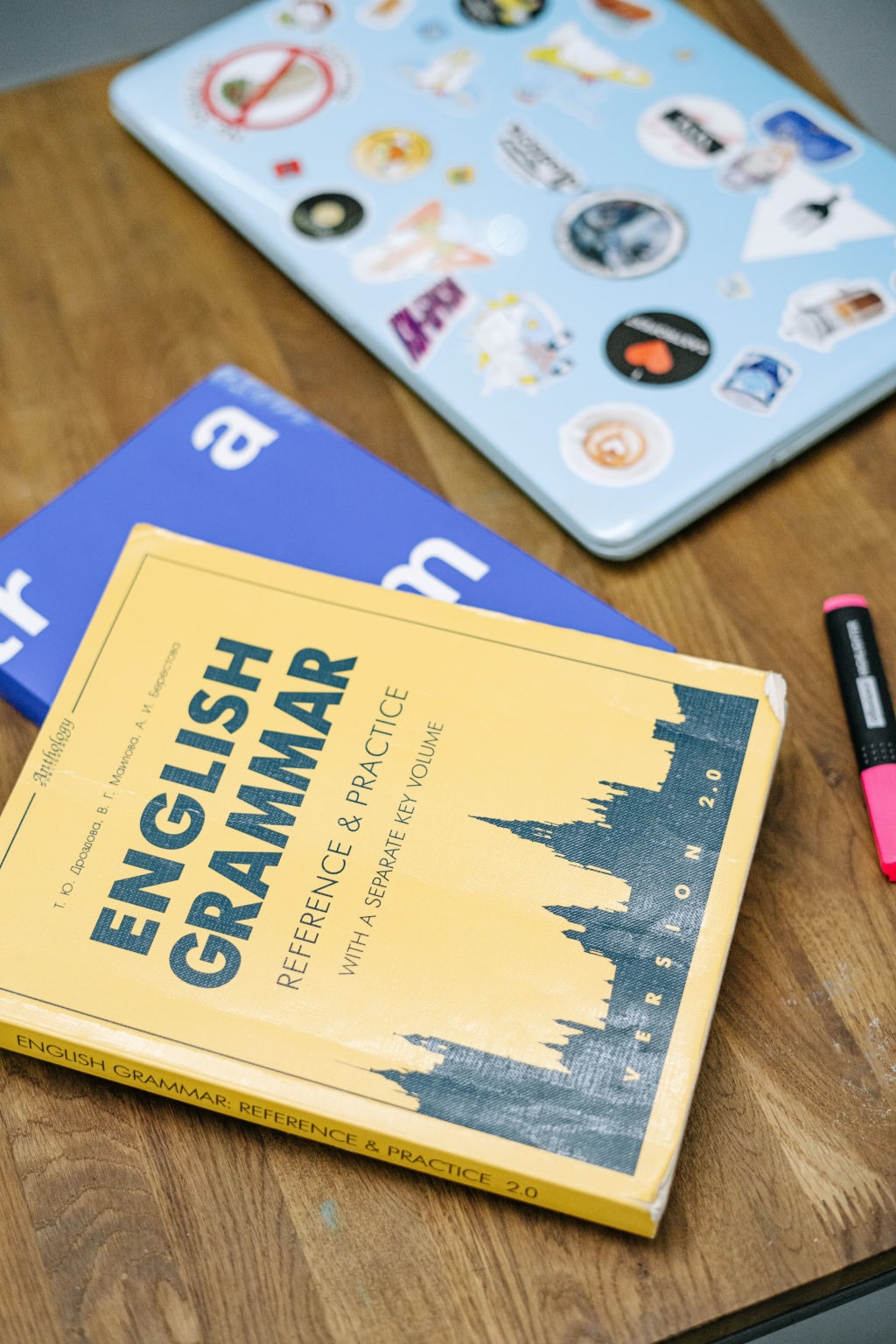Polish Your Prose: Vocal's Writing Tips Crib Sheet
Master punctuation and grammar to elevate your work

At Vocal, we’re keen to help you succeed in your work—not just in Challenges, but throughout all of your writing across the site. To that end, we’ve put together a few notes on the fundamentals of punctuation, dialogue, and grammar. Really, it’s about getting a handle on those fiddly bits of language and mysterious laws of prose (and, let’s face it, we could all use the occasional reminder). Of course, the rules of grammar are only a beginning, and most of all we want you to develop your own unique and exciting voice; but if you’re ever in doubt about errant commas or pesky apostrophes, we hope it can be of help. Happy writing!
Examples of Punctuation and How to Use Them
.
Full-stop/period. This indicates the end of a sentence. Once you have used a full-stop, the next sentence starts with a capital letter.
,
Comma. These are used either to introduce subordinate clauses, in which you add more meaning to a sentence, or else make a list. I.e.:
‘Writing good prose, if you want to write well, requires patience and practice.’
‘This document is giving advice on how to use full-stops, commas, semi-colons and other punctuation.’
Note: If you want to get a little more advanced, there is something called The Oxford Comma. This comes before an ‘and’ and denotes the end of the list. Using an Oxford Comma, the example above would read: ‘This document is giving advice on how to use full-stops, commas, semi-colons, and other punctuation.’ This, however, is largely a matter of personal preference and is not strictly necessary.
;
Semi-colon. A semi-colon is a little trickier than a comma and is used when you require a more forceful break in a sentence. Otherwise, it can be used to put together lists that need more information for each constituent point. I.e.:
‘A semi-colon can take a bit of getting used to; however, once mastered, it’s a great addition to your writing.’
‘There are many aims to this Writing Tips Document: first, it delineates the different uses of certain punctuation, form the simple to the more complex; second, it wishes to help writers with dialogue, so that they can clearly show when two characters are speaking; and finally, it points out some common mistakes in vocabulary.’
:
Colon. A colon is used to introduce a piece of information, or else create emphasis. I.e.:
‘There is one piece of punctuation crucial to introducing the main point of the sentence: the colon.’
( )
Brackets/parentheses. Brackets are used to add something to a sentence that doesn’t strictly need to be there. I.e.:
‘My sentence already has all the necessary information (but a bracket can add a little extra).’
Note: we might also see here that a bracket or a parenthesis is a great narrative or poetic tool: it can, for example, create sense of confidence or shared secrecy between the writer and the reader; it can give a sense of sarcasm or irony; it can show us what a character is truly thinking, rather than what they’re presenting; and, speaking more generally, keeps your conveyance of information fresh and interesting.
(One more thing: if you’re writing a whole sentence that takes place inside a pair of brackets, the full-stop goes on the inside, like this.)
-
Hyphen. Hyphens are used to make compound words. These can be nouns (naming words) or adjectives (describing words) I.e.:
‘coffee-table’ (compound noun)
‘rain-splashed window’ (compound adjective)
–
En-Dash. The en-dash (so-called because it’s around the length of a letter ‘N’) is a little longer than a hyphen and is used like parenthesis and to create a subordinate clause.I.e.:
‘An en-dash can also be used – in place of commas – to make subordinate clauses.’
—
Em-Dash. An em-dash (so-called because it’s around the length of a letter ‘M’) is the longest dash and is used to mark off the end of sentence that takes a slightly sharper turn. I.e.:
‘I had been using a hyphen this whole time—but then I realized my mistake.’
’
Apostrophe. An apostrophe can be used for two purposes. First, it is used to denote ownership. For a singular genitive noun (a noun that owns something), it comes before the ‘s’. I.e.:
‘A mother’s love’.
If you are giving ownership to a plural (that’s a noun that denotes more than one thing), you place the apostrophe after the ‘s’. I.e.:
‘the crows’ black feathers’
You can also use it to contract or abbreviate to words. I.e.:
o’clock (of the clock)
they’re (they are)
it’s (it is)
s’ppose (suppose)
“ ”
Speech-marks. Perhaps obviously, speech-marks show that someone is speaking (we’ll go into this more in-depth in the next section). I.e.
“Look at me, I’m talking out-loud,” cried Jack, very pleased with himself.
How to Write Simple Dialogue
Firstly, whenever somebody starts speaking, their words take a new paragraph. And when they’re finished speaking or interacting, it’s another new paragraph. So, if I were to introduce two characters called Tom and Kate, who were meeting up after a long time, I’d write the set up and the dialogue as follows:
Tom walked into the room to find Kate leaning against the wall of their old office.
“Hello,” said Tom. “It’s nice to see you.”
“How have you been?” replied Kate, smiling and putting out a hand.
“Not too bad.” As Tom spoke, he shifted uncomfortably, as though hiding something.
Kate thought back to the day they’d met, how free and easy-going Tom had been. That was a long time ago, before everything changed.
Take a moment to look carefully at how the punctuation is arranged depending on how the information is being conveyed. It can take a while to get the hang of this, but it’s worth it. Following the rules of dialogue makes your prose much clearer and easier to read. (If in doubt: refer to a book that you love; see how that author has arranged the dialogue and take your cues from them.)
Some vocabulary tips
‘Uninterested’ = Not interested
‘Disinterested’ = Ambivalent; not influenced by considerations of personal advantage.
‘Advice’ = Noun. ‘I’ll give you some advice’.
‘Advise’ = Verb. ‘Allow me to advise you’.
‘Practice’ = Noun. ‘This was her general practice when it came to working.’
‘Practise’ = Verb. ‘If I want to get good at this, I’ll need to practise more.’
Note: This rule is only the case in the UK. In US English, ‘practice’ is used as both a noun and a verb.
It’s = Contraction of ‘it is’
Its = The thing belongs to it. I.e.: ‘The house was huge: its bedroom alone was forty square feet.’
‘Their’ = Belongs to them. I.e.: ‘It was their house.’
'They’re' = Contraction of ‘they are’. I.e.: ‘They’re really great people.’
‘There’ = An adverb that denotes the place of position of something. I.e.: ‘It’s over there’.
‘Could have’ = Correct
‘Could of’ = Incorrect
‘Less’ = Refers to something that cannot be counted. I.e.: ‘There was less sunlight than the previous morning.’
‘Fewer’ = Refers to something that can be counted. I.e. ‘There are fewer people here than last year.’
Some general tips
- As you’re writing, make sure you’re careful about what tense you’re in. If you’ve started in present tense (‘I get up and look around the room’), don’t suddenly slip into past tense (‘I get up and look around the room. I saw a terrifying sight’). Keep an eye on tense-slips, as it can be very jarring to your reader.
- If you’re unsure of what punctuation to use, or what tense you’re in, don’t overcomplicate your sentence. Sometimes a short, pithy sentence makes the point better than an overlong and complex one.
- When preparing for a Writing Challenge, make sure to read and re-read the challenge rules.
- Above all, it’s essential to learn and practice all of these rules carefully as a kind of baseline, but they should by no means be totally restrictive: many great writers (think of Charles Dickens, George Eliot, James Joyce, or Toni Morrison) have manipulated ‘Standard English’ to create unique and lasting narrative voices. Get to know the fundamentals, and then you can have fun breaking the rules.
About the Creator
Vocal Curation Team
Collaborative, conscious, and committed to content. We're rounding up the best that the Vocal network has to offer.
Reader insights
Nice work
Very well written. Keep up the good work!
Top insight
Expert insights and opinions
Arguments were carefully researched and presented





Comments (18)
In the apostrophe section, where you wrote "You can also use it to contract or abbreviate to words" did you mean two words?
Good article and very helpful. Thank you. ( Under Semi colon paragraph - review the word “form”.) Friends help friends. Feel free to delete this message ☺️
It was very well written. Thanks for sharing. I will definitely put them into practice.
It was very well written. Thanks for sharing. I will definitely put them into practice.
A very helpful article I shall be returning to on many occasions. Many thanks.
super informative. I am new to Vocal. Hoping for great things in future.
Great post
Thank you for sharing this resource!
I’m never 100% sure about colons and semi-colons so thanks for this!
Very helpful thank you :)
This is excellent. ‘Could of’ drives me nuts.
Very helpful, thank you
Your writing tips are incredibly insightful and practical, making it so easy for aspiring writers like myself to enhance our prose. I appreciate how you've organized the information into a concise crib sheet that I can refer to whenever I need a quick refresher. Your passion for writing truly shines through your words, and it's contagious! Thank you for sharing your expertise and empowering others to polish their prose. You've definitely gained a loyal reader in me! Keep up the fantastic work!
Thanks. I could of used this ages ago! 🤨
Keep sharing these tips, please.
I love the Oxford Comma.
Very helpful, thank you for disseminating ❤️💯
Really helpful. I'm familiar with almost everything on here, but the section on dashed was actually new to me (the em-dash and en-dash for example). Thanks for writing this.